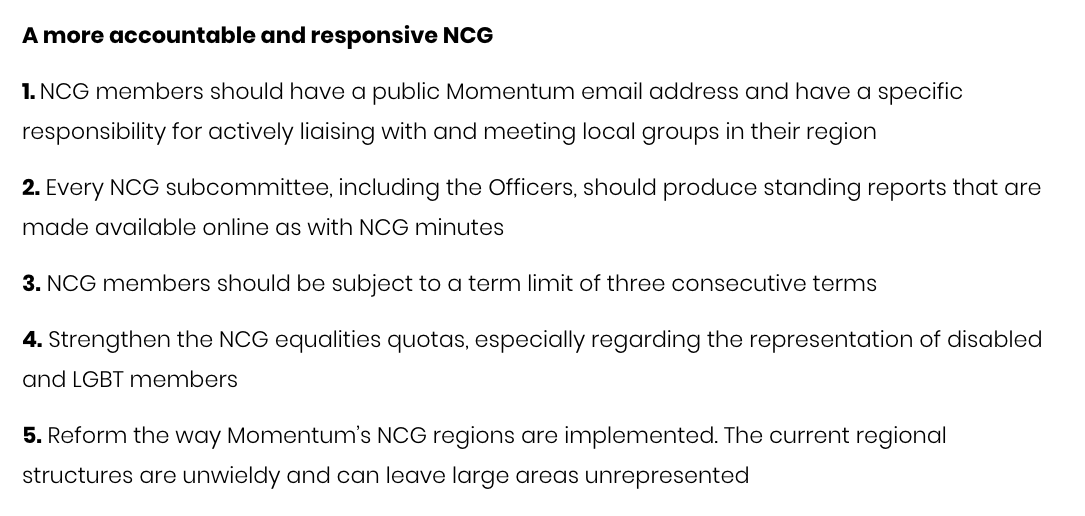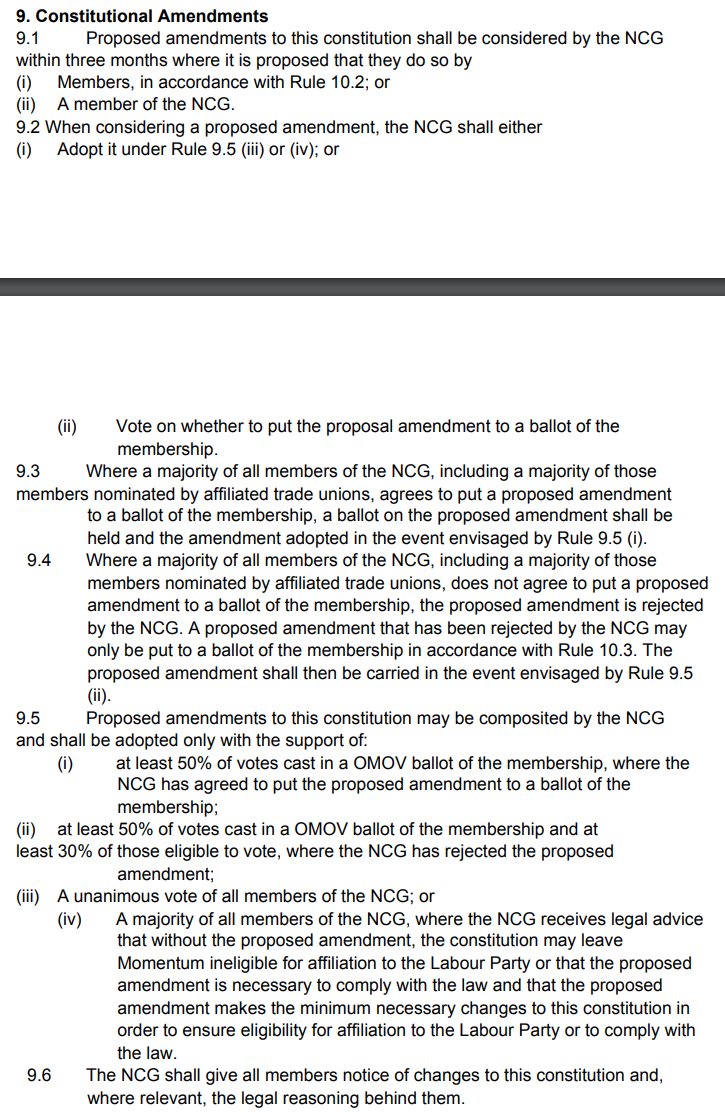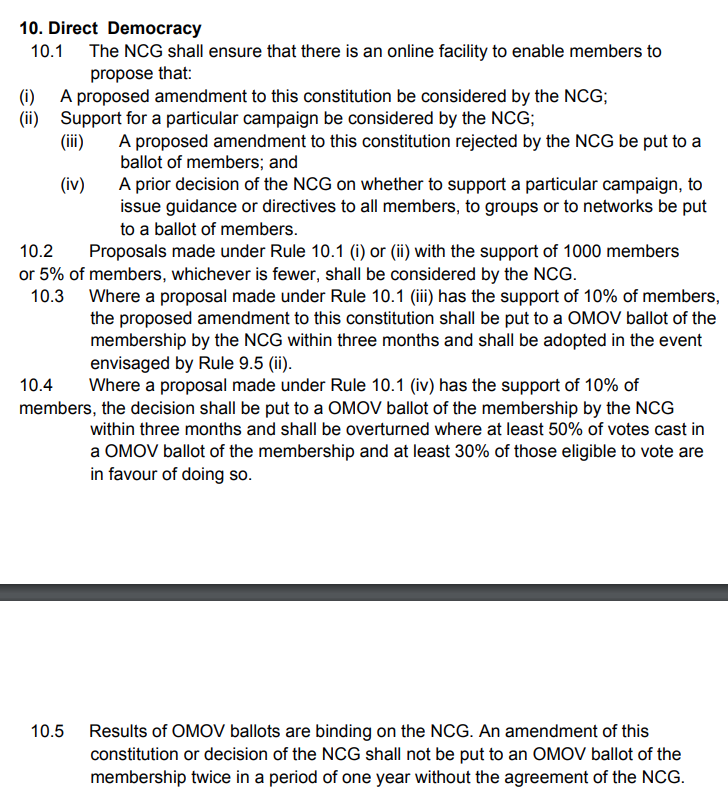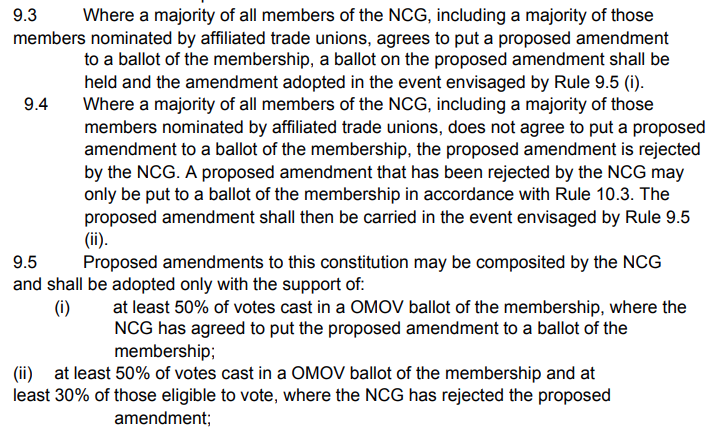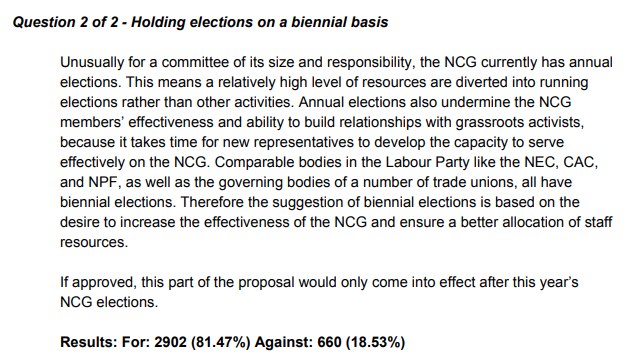Saying what Momentum *should* do is all very well, but there has to be fit between organisational form and function. Without good ideas on what *form* best allows Momentum to fulfil those functions, and how we get there from its current form, all you’ve got are good intentions.
The most basic problem with @Mom_Renewal& #39;s platform is the absence of a serious critique of Momentum& #39;s current form. The list of & #39;our demands for reform& #39; on their website is vague and includes no major, concrete changes to the organisation or its constitution.
& #39;there should be more x& #39;, & #39;y needs to be improved& #39; - it& #39;s nice to say you have these intentions, but if the current organisational form hasn& #39;t led to them, what& #39;s wrong with that form? Vaguely saying Momentum needs to & #39;break out of the London bubble& #39; is not a substitute.
Or saying & #39;NCG members should do X& #39; - ok yes, but what in the constitution actually promotes NCG members& #39;s accountability for *not* doing X? Momentum lacks basic mechanisms for promoting transparency and accountability. The Members& #39; Council was supposed to help, but it& #39;s defunct.
I think Momentum needs to go through a complete, democratic, member-led refoundation process, and to emerge with an organisational structure featuring more democracy, accountability and transparency, with strong mechanisms to monitor executive power and enforce commitments.
But I also think candidates for the NCG should come out with concrete ideas and proposals for reform that could be fed into that process and debated - not least to demonstrate they& #39;ve thought seriously about radical reform and that their commitment isn& #39;t just nominal.
Having looked pretty closely at Momentum& #39;s constitution, I think @Mom_Renewal& #39;s list of & #39;our demands for reform& #39; is nowhere near good enough: either because of an inadequate understanding of what& #39;s wrong with the organisation, or a lack of serious commitment to reform.
For instance, it contains nothing on the Members& #39; Council, or any other means of providing oversight to ensure the NCG will be made to abide by commitments like the one that its subcommittees should produce standing reports.
It also promises to expand the scope of e-democracy, but doesn& #39;t even commit to realising the provision in the *existing* constitution that there should be an online facility for members to initiate their *own proposals*, not just vote on the NCG& #39;s.
The wording of @Mom_Renewal& #39;s & #39;demands& #39; is completely compatible with the NCG retaining exclusive power to initiate proposals to be put to all-member ballots, and therefore also to frame those proposals by deciding their wording.
There is also nothing on how the current approval thresholds for all-member ballots should change. They& #39;re quite complicated, but basically make it extremely easy to pass a proposal which has the NCG& #39;s approval, and very hard for proposals without that approval.
There& #39;s also a provision at 9.4 which - together with 10.3 (see above) effectively gives a majority of trade union affiliate representatives on the NCG the ability to impose an extremely high threshold for members& #39; approval of constitutional amendments in all-member ballots.
In summary, it means that a few trade union affiliate representatives on the NCG can block constitutional amendments that are supported by *both* a majority of the NCG as a whole, and a majority of Momentum voting members *if* the latter are less than 30% of the membership.
For a slightly clearer explanation of the e-democracy process, see here: https://peoplesmomentum.com/constitution/ ">https://peoplesmomentum.com/constitut... Though note it omits the detail i& #39;ve pointed out about trade union affiliate representatives.
When the NCG put its own proposals to the membership in September last year, it secured approval for its proposals on turnout of just over 3,500 out of a roughly 40,000 membership, i.e. turnout of less than 10%. https://peoplesmomentum.com/wp-content/uploads/2019/09/democracyballotresults092019.pdf">https://peoplesmomentum.com/wp-conten...
So whereas constitutional reform proposals rejected by the NCG would require the votes of at least about 12,000 members to be approved, the NCG& #39;s own proposal to move its own elections from an annual to biennial basis was approved with the votes of just 2,902 members
Having said all that, clearly the fact members still can& #39;t put forward their own proposals at all is the far bigger flaw with Momentum& #39;s & #39;e-democracy& #39;, which was touted as the major selling point of the current constitution when it was introduced by the Steering Committee in 2017
Ironically, there was no & #39;e-democracy& #39; process for members to approve or reject the new constitution. Only the Steering Committee& #39;s approval was required - a body selected under the old constitution, whose inadequacy the SC claimed to argue a new one was required.
This new constitution was being discussed & voted on at the first meeting of Wandsworth Momentum I went to. It was made clear at the meeting that the new constitution was a fait accompli, to be imposed regardless of what we ordinary members thought, or how local groups voted.

 Read on Twitter
Read on Twitter
